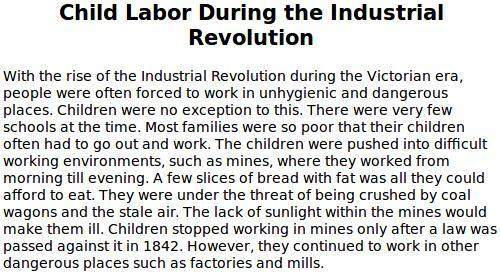
English, 19.10.2019 08:30 gameranonymous266
Miss prism. . the good ended happily, and the bad unhappily. that is what fiction means. how does the epigram affect this scene?
a. it suggests the serious idea that tidy endings are uncommon in real life.
b. it explains the humorous idea that bad endings are usually happy.
c. it introduces the pessimistic idea that happy endings only happen in stories.
d. it reveals the optimistic idea that most endings are a good thing.

Answers: 3


Another question on English

English, 21.06.2019 18:10
Read the passage from sugar changed the world. sugar is different from honey. it offers a stronger sweet flavor, and like steel or plastic, it had to be invented. in the age of sugar, europeans bought a product made thousands of miles away that was less expensive than the honey from down the road. that was possible only because sugar set people in motion all across the world—millions of them as slaves, in chains; a few in search of their fortunes. a perfect taste made possible by the most brutal labor: that is the dark story of sugar. how does the comparison of sugar to honey reveal the authors’ purpose? it persuades readers that sugar tastes better than honey. it informs readers that there is a connection between slavery and sugar. it informs readers that honey had a major impact on society. it persuades readers that sugar is as important an invention as steel.
Answers: 1

English, 21.06.2019 20:30
Use morphology and syntax to make grammatical sense of the following sentence (mark all that the ova of all mammals except the monotremes undergo holoblastic segmentation. the -s inflection indicates that monotremes is a plural noun. the suffix -ic indicates that holoblastic is an adjective. the suffix -ation in the word segmentation is a noun-forming suffix denoting a process. the -s inflection indicates that monotremes is a possessive noun.
Answers: 2


English, 21.06.2019 23:30
4. at the conclusion of frankenstein, robert walton has an encounter with the monster, who arrives after victor frankenstein has died. perhaps surprisingly, the monster mourns his creator and expresses remorse over the fate that victor suffered. the monster pledges to destroy himself and then departs, disappearing as he goes further north. how does the monster’s behavior and attitude in this part of the novel affect the way readers view him? is he sympathetic? is he more hateful because it is only after victor has died that he relents? how does the change in the monster fit with the theme of duality in the novel?
Answers: 1
You know the right answer?
Miss prism. . the good ended happily, and the bad unhappily. that is what fiction means. how does...
Questions








English, 29.02.2020 01:41



Chemistry, 29.02.2020 01:41





History, 29.02.2020 01:42




Mathematics, 29.02.2020 01:42




